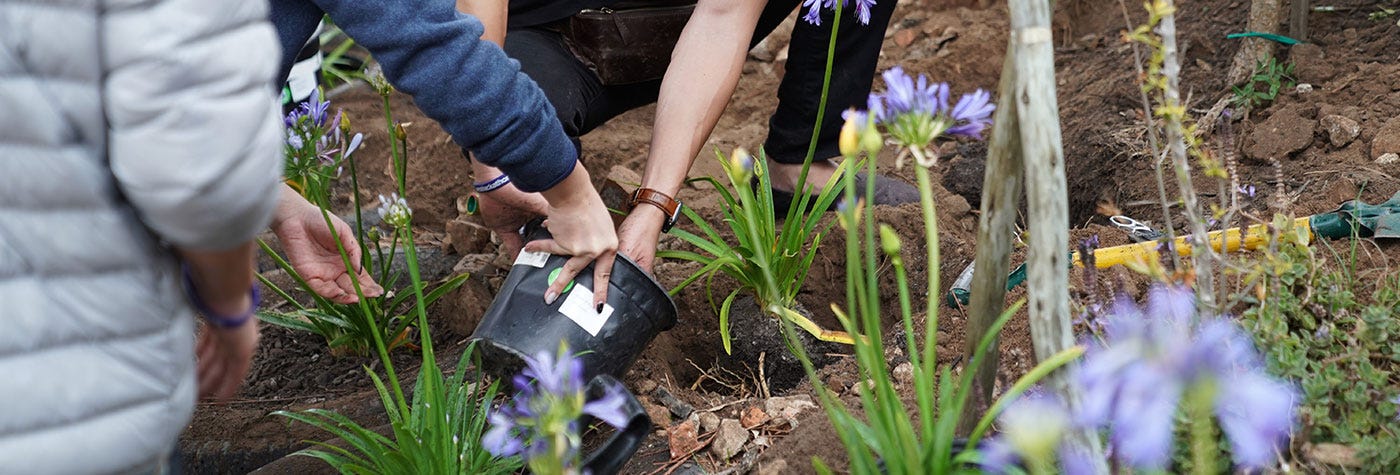
译文/Translated:
从创立之初,Block.one就一直关注如何给世界带来它所需要的区块链技术,尤其是以下两个方面:能够迎合大规模生产力的交易速度;规模化,即如何支持随着时间推移越来越大宗和复杂的大规模操作。然而,人们也意识到,要推动区块链的前景,还有第三个必要的条件:即有利于环境可持续的产品。
关于区块链和加密货币领域的媒体报道很容易关注产生或“挖矿”一些加密货币中产生的大量能耗。这确实是对的,但是,他们却忽略了还有其它的可能性。尤其是,EOSIO—Block.one工程师开发和发布的开源协议—不仅提供了一个非常高效的运行区块链的方式,消耗的能源还不多。
比特币网络(以及其它各类区块链网络,包括以太坊)部署工作量证明(PoW)公式机制来维护其共享账本、增加新的区块,但它们的机制非常浪费计算能力和电力。要解答一个数学题或者“挖矿“,这个过程涉及到网络中大量节点间的竞争。
与之相对,EOSIO(以及其它一些区块链公司)采用的委托权益代表(DPoS)机制则是把这项任务分配给21个“区块生产者”,即维护网络并且因此获益的节点,但是,这些节点是可以被取代的,只要通过投票,他们就可以被“候补”所替代。
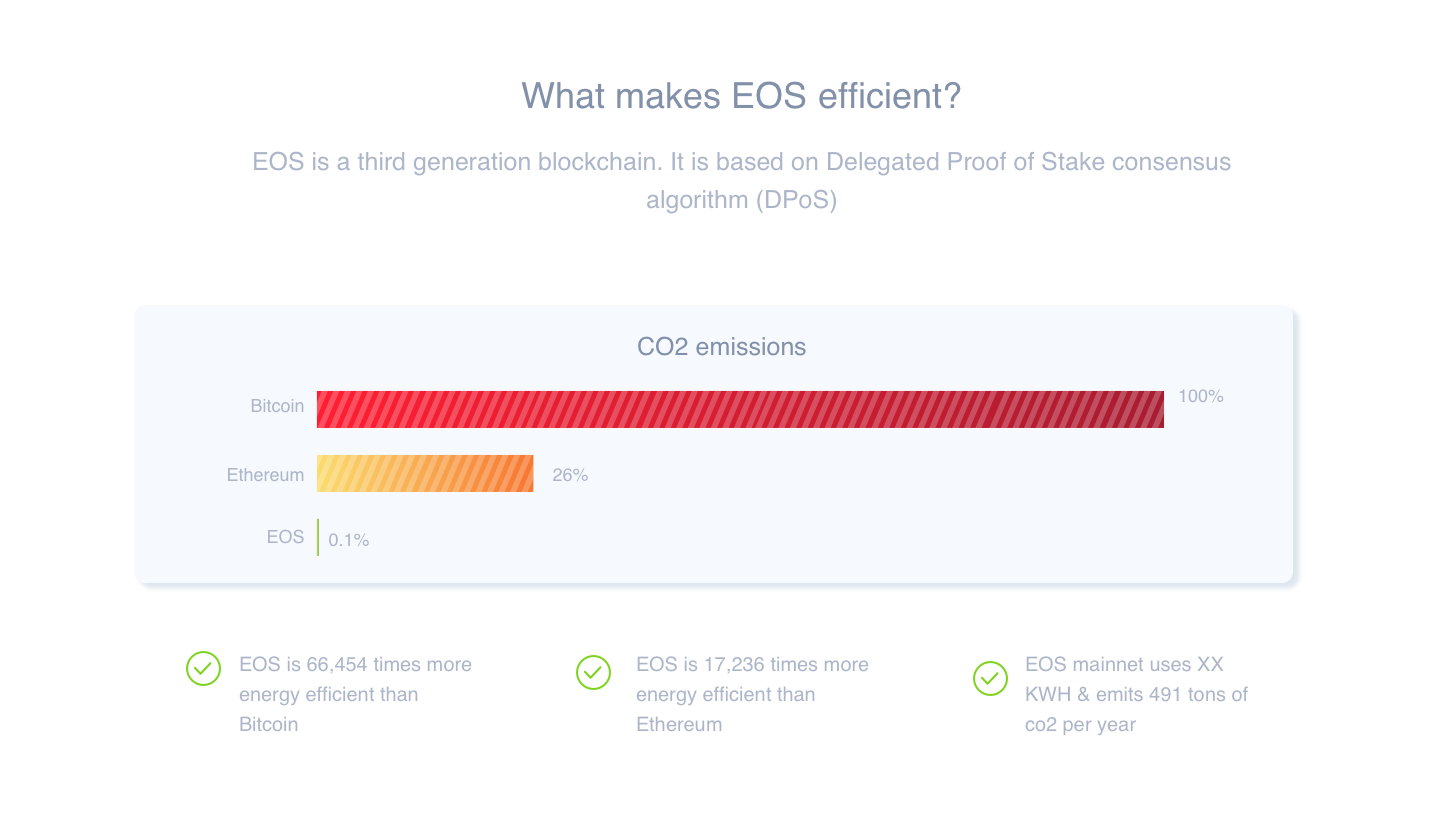
EOSIO有着闪电般的速度—每秒能够处理3996个交易和计算,而比特币和以太坊每秒只能处理15个—同时,DPoS机制保证EOSIO在处理过程中更加环保。根据“社会企业候选区块生产者”Genereos的计算和Digiconomist的同行评审(分别参见这里和这里),DPoS的能源效率是比特币的66,454倍,是以太坊的17,236倍。
EOSIO本来能耗就比较低了,但重要的是,在过去几个月里,它还尝试进一步减少排放。在知名区块生产者EOS官方的带领下,EOS社区和ClimateCare的气候和可持续发展专家合作,首先计算EOS公链服务器产生的二氧化碳,其次,通过投资(经由ClimateCare)清洁能源和安全水项目抵消这些排放。
其结果是,其主网—独立于Block.one运营和管理的社区—现在可以自称是世界上第一个碳中和服务器。
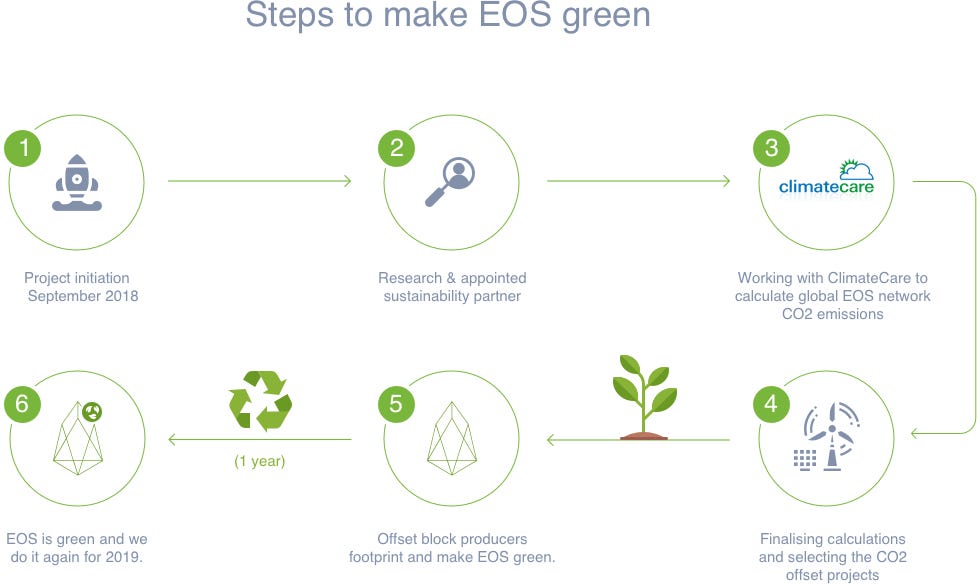
ClimateCare的发言人告诉Block.one:“我们很高兴地知道EOS 官方已经意识到这个技术的环境影响并且愿意采取积极的一步来抵消排放。我们希望他们的行动会鼓励其它同行跟随他们的脚步。”
该社区的这个行动某种意义上标志了EOSIO背后的社会责任感,这种责任感对于Block.one的任务至关重要,也通过EOS社区的其它显著的方式体现出来。
比如说,在近期刚刚结束的EOS全球黑客马拉松8月份的悉尼赛事中,挑战主题是要求黑客们开发一个app,使它能够“让民众为未来的自然环境发挥作用”。
获奖团队包括:Smartpress,这个两人的团队的目标是帮研究者建立智能合约检测环境变化,但是研究者本人不需要懂代码;还有Tokentree,他们开发了一个游戏鼓励大家采取措施阻止森林砍伐;True Originals,他们的解决方法是让顾客验证商品来源。
12月初,这些团队和其它团队在开普敦参加了决赛,参赛的18支队伍中一个特别显著的特征是,他们的项目都明显考虑社会影响维度。
Vital Sounouvou和他的同事在开发仁爱能源账本(Ubuntu Energy Ledger),这个肯尼亚投资平台旨在把太阳能的投资者和真正的太阳能发电厂和消费者联系起来。他告诉Block.one,他相信环境和社会的可持续性是区块链价值主张的关键。
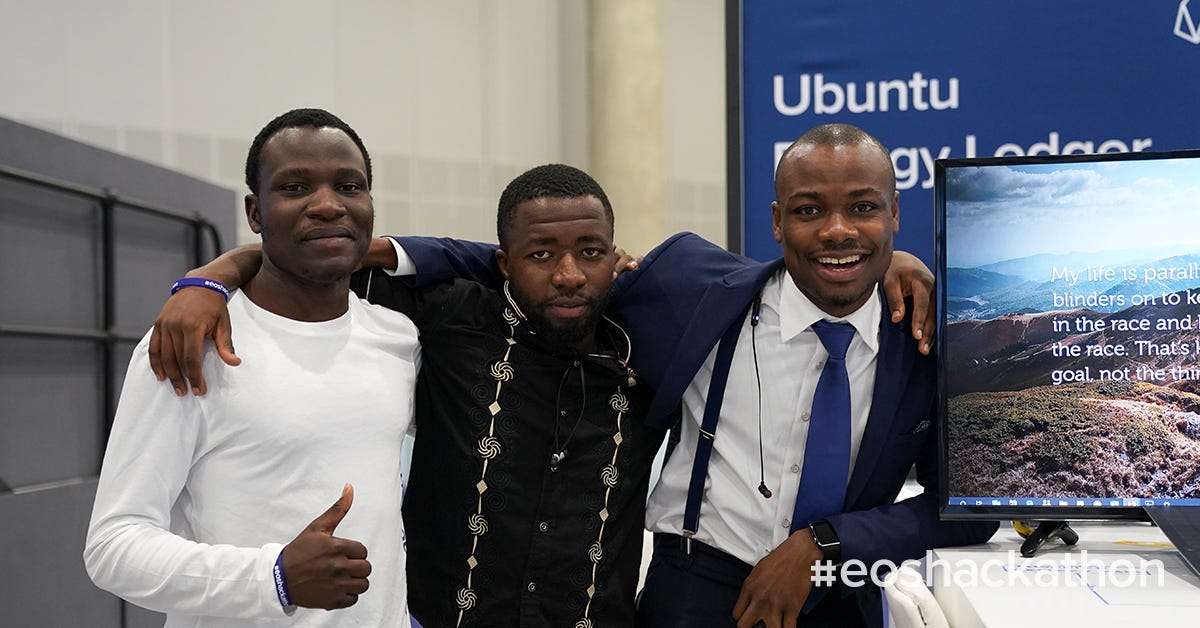
“作为区块链开发者,我们有机会创造出真正具有社会影响力的解决方法,其中一个原因是技术本身带来各方之间新的信任水平,”他说。
其它EOS决赛队伍的关注点在解决棘手的人类问题,其中包括:EOS EBT食品补助券团队,这款app让美国依靠食品补助券生活的家庭可以利用这些补助券线上购物;Smart City Steroids,其目标是在印度的公共招投标系统中建立透明度和问责制;决赛冠军GeneOS的项目鼓励个人通过安全、匿名的方式捐献基因数据,以进一步研究疾病。
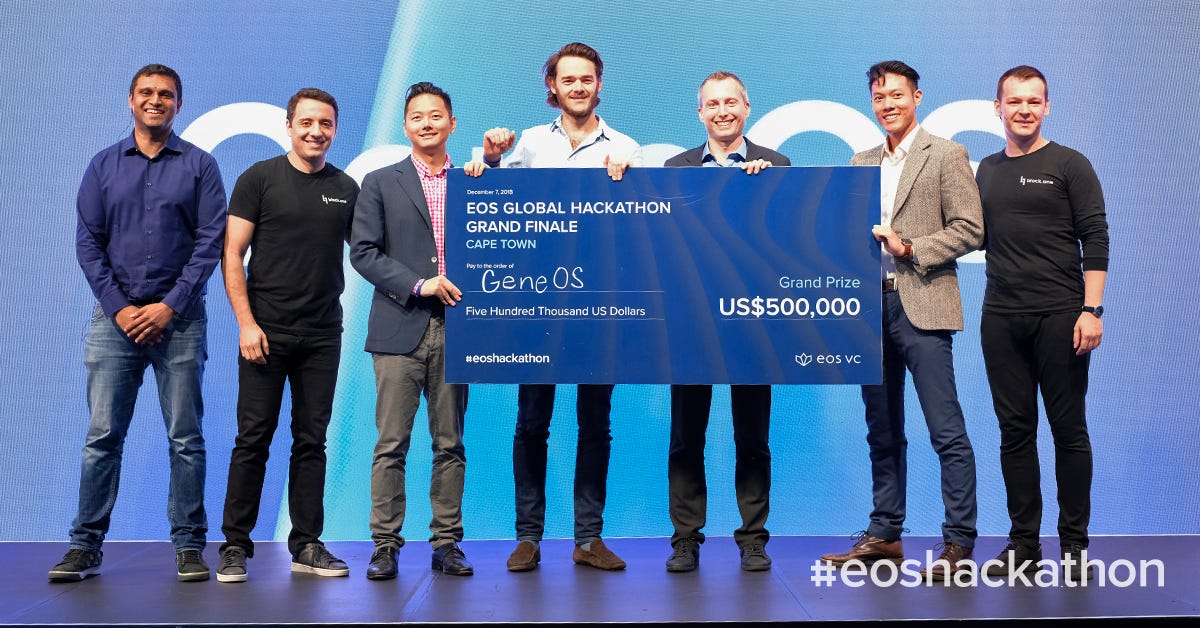
区块链量子影响(Blockchain Quantum Impact) CEO,Jane Thomason博士和Block.one一样,相信区块链可以改变环境和社会经济的游戏规则,她在南非的比赛中说:“区块链是全球经济危机之后,不满政府和银行的民众开始的一场社会运动,这是区块链的核心。我遇到和接触的很多开发者希望能够改变世界,希望能让世界变得更美好,科技让我们能够把底层的数十亿没有银行账户的人和全球经济联系起来、让没有国籍的人能够获得电子身份,让微电网太阳能无处不在,让妇女和女孩通过智能合约获得直接利益。
为了和这个目标保持一致,Block.one在开普敦组织了一次植树和信息分享会,他们参观了当地一所小学,了解当地的环保和资源管理议题。
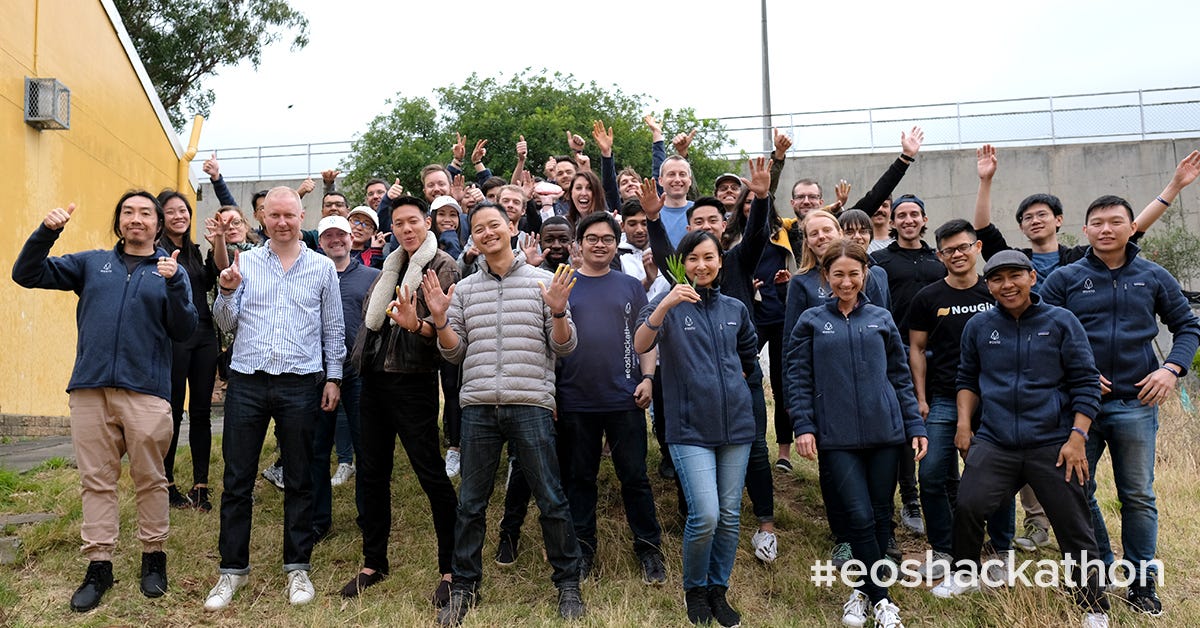
他们参观的小学位于开普敦东南角的平原区,这个小学是和当地的环保非营利组织Greenpop合作的15个学校之一,其合作的项目是Gynbos for the Future,项目核心是城市绿化和环保教育。
这次访问不仅让程序员有机会从繁重的编程和社交中喘一口气,同时还加强了他们对环境可持续发展的投入,这种高投入似乎也渗透到EOSIO区块链和DPoS共识机制的支持者去了。
随着区块链的早期采用这会继续推进区块链能做的极限,很明显,EOS社区在赋予个人和社区力量的同时,它也尊重和善待自然界适应和转变的天赋。最终,EOSIO运动显示了科技的进步同样可以给生态敏感性带来新的标准和模式,而不是加剧地球的灾难。
原文/Original:

Since its inception, Block.one has focused on giving the world what it needs from blockchain technology: in particular, transaction speeds that can accommodate large volumes of throughput; and scalability, or the means to support large-scale operations that grow and evolve over time. It has also been conscious, however, of a third imperative in the race to deliver on blockchain’s promise: namely a product that is environmentally sustainable.
Media coverage of the blockchain and cryptocurrency sector is often quick to highlight the huge levels of energy consumption involved in producing, or “mining” some cryptocurrencies. It is right to do so. What is all too often missed out, however, is that there are alternatives. In particular, EOSIO — the open-source protocol developed and published by Block.one’s engineers — offers an infinitely more efficient way to run a blockchain, and one that consumes a tiny fraction of the energy.
The Proof-of-Work (PoW) consensus mechanism deployed by the Bitcoin network (and others, including Ethereum) to maintain its shared ledger and add new blocks, is hugely wasteful of computing processing power and electricity. It involves a vast army of nodes on the network competing to solve a mathematical puzzle and “mine” tokens.
By comparison, the Delegated Proof-of-Stake (DPoS) mechanism that is used in EOSIO (and some other blockchain ventures), involves delegating this work to a body of 21 “block producers”, nodes who maintain the network and are rewarded for doing so but who may be substituted, through a voting process, for “standby” candidates.

Not only has EOSIO demonstrated lightning-fast speeds — 3,996 transactions per second and counting, compared to around 15 per second on Bitcoin and Ethereum — but DPoS allows it to operate in a much more eco-friendly manner. According to calculations done by the “social enterprise block producer candidate” Genereos and based off peer-reviewed research by Digiconomist that can be accessed here and here, DPoS is 66,454 times more energy-efficient than Bitcoin, and 17,236 times more energy-efficient than Ethereum.
What’s more, over the last several months, efforts have been afoot to neutralize even these lower-level emissions. Led by EOS Authority, a prominent block producer, the EOS community has been working in partnership with climate and sustainable development experts from ClimateCare to first of all calculate the CO2 emissions produced by the EOS public blockchain servers, and secondly to offset those emissions through investments (via ClimateCare) in clean-energy and safe-water projects.
The result is that the network — a community undertaking that is operated and governed independently of Block.one — can now lay claim to being the world’s first blockchain with carbon neutral servers.

A ClimateCare spokesperson told Block.one: “We’re delighted that EOS Authority has recognized the climate impacts of the technology sector and taken this positive step forward to compensate for their emissions. We hope that their actions will encourage others in the sector to follow their lead.”
The action taken by the community in a sense epitomizes the ethos of social responsibility that underpins EOSIO, an ethos that is also fundamental to Block.one’s mission and has manifested itself through the EOS community in several other notable ways.
For example, at the Sydney leg of the recently-concluded EOS Global Hackathon series, in August, the “challenge” laid down to hackers asked them to create an app “that will empower the public to play a role in sustaining natural environments for the future.”
The winners of that event included Smartpress, a duo aiming to help researchers build smart contracts for monitoring environmental variables without having to know code; Tokentree, a team building a gamified app to incentivize individuals to take action against deforestation; and True Origins, whose solution will allow consumers to verify the provenance of goods.
In Cape Town, in early December, these teams joined winners from other events in the series for a Grand Finale week, and one of the most striking features about the 18 finalists was that so many of their projects involved an unmistakable social impact dimension.
Vital Sounouvou, who along with his associates is developing Ubuntu Energy Ledger, a Kenya-based platform aiming to connect investors in solar energy with real solar plant providers and consumers, told Block.one he believes environmental and social sustainability are key to blockchain’s value proposition.

“As blockchain developers, we have a chance to create solutions that have a real social impact, partly because the technology itself allows new levels of trust between different parties,” he said.
Other EOS finalists whose efforts were focused on addressing intractable human problems included EOS EBT Food Stamps, whose app would allow individuals on food stamps in the US to use them to buy from online retailers; Smart City Steroids, whose aim is to create transparency and accountability in public tender systems in India; and the ultimate winners, GeneOS, whose project incentivizes individuals to donate genomics data in a secure, anonymized way to further research into disease.

Speaking in Cape Town, Dr Jane Thomason, CEO of Blockchain Quantum Impact and an ally of Block.one in its advocacy of blockchain as an environmental and socio-economic game-changer, said: “At its core, blockchain originated as a social movement by people who were dissatisfied with governments and banks following the global financial crisis. Many developers I meet and interact with want to change the world and make it a better place. The technology enables us to connect the bottom billion unbanked to the global economy, to provide digital identity to stateless people, to make micro grid solar power ubiquitous, and through smart contracts, to bring direct benefits to women and girls.”
In-keeping with this impetus, while in Cape Town Block.one organized a tree-planting and knowledge exchange visit to a local primary school to learn about local conservation and resource management issues.

The school is one of 15 in the Cape Flats that works with Greenpop, a local environmental non-profit organization, on an urban greening and environmental education program called ‘Fynbos for the Future.’
As well as providing an opportunity to take a breather from coding and engage with the local community, the visit reinforced the devotion to environmental sustainability that seems to permeate advocates of the EOSIO blockchain and supporters of the DPoS consensus mechanism.
As blockchain’s early adopters continue to push the boundaries of what it can deliver, it’s clear that the EOS community is thinking big when it comes to empowering individuals and communities whilst also respecting and befriending nature’s own genius for adaptation and transformation. Ultimately, the EOSIO movement shows that advances in tech can help to forge new standards and norms of ecological sensitivity, rather than contributing to our planet’s woes.
Originally published at block.one.
原文链接/Original URL: